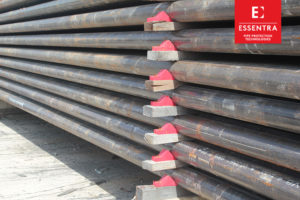In industries where pipes play a critical role, such as oil and gas, construction, and manufacturing, the importance of maintaining the integrity of pipe threads cannot be overstated. Pipes are the arteries of many industrial operations, and the threads that connect them are crucial to ensuring a tight, leak-free seal.
Thread damage can lead to leaks, contamination, and potentially catastrophic failures. This is where pipe thread protection technology comes into play. By safeguarding the threads from damage during transport, storage, and handling, these protective solutions help maintain the reliability and longevity of pipes, saving companies time and money in the long run.
What is Pipe Thread Protection?
Pipe thread protection technology encompasses a variety of devices and methods designed to shield the threaded ends of pipes from damage. These protective measures are crucial during the transportation and storage of pipes, as they prevent the threads from becoming dinged, dented, or otherwise compromised.
Common forms of thread protection include thread protectors, caps, and plugs, which can be made from materials like plastic, rubber, or metal. Each type of protector serves a specific purpose, depending on the pipe’s material, size, and the conditions it will face.
The Role of Thread Protectors
Thread protectors are the most widely used form of pipe thread protection. These devices are designed to cover the threads of a pipe, providing a barrier against physical damage, corrosion, and contamination. Thread protectors can be classified into two main categories: open-end and closed-end.
Open-end protectors allow air circulation, which is crucial for preventing moisture buildup that can lead to rust. On the other hand, closed-end protectors provide complete coverage, keeping out dirt, debris, and other contaminants that could compromise the integrity of the threads.
Material Matters
The material used for thread protectors is a critical factor in their effectiveness. Plastic protectors, for instance, are lightweight and cost-effective, making them ideal for applications where weight is a concern. They are also resistant to corrosion, which makes them suitable for use in environments where exposure to moisture or chemicals is likely.
Rubber protectors offer excellent flexibility and durability, providing a snug fit that ensures the threads are fully covered and protected. Metal protectors, often made from steel or aluminum, provide the highest level of protection, particularly in harsh environments where impact resistance is crucial.
The Consequences of Unprotected Threads
Neglecting to protect pipe threads can have serious consequences for the pipes themselves and the entire operation. Damaged threads can lead to several issues, including:
1. Leaks: The primary function of pipe threads is to create a secure, leak-proof connection between two pipes. If the threads are damaged, they may not form a tight seal, leading to leaks. In industries like oil and gas, where hazardous materials are often transported through pipelines, a leak can have devastating environmental and financial consequences.
2. Contamination: Threads exposed to dirt, debris, or moisture can become contaminated, which can then be transferred into the pipe. This is particularly problematic in industries where cleanliness is critical, such as food and beverage, pharmaceuticals, or water treatment. Contaminated threads can introduce foreign substances into the pipe, contaminating the system.
3. Reduced Lifespan: Damage to pipe threads can significantly reduce the pipe’s lifespan. Threads that are dinged, dented, or corroded may not be able to withstand the pressures and stresses of operation, leading to premature failure. This not only results in costly repairs or replacements but can also lead to downtime, which can significantly impact productivity.
4. Increased Costs: Repairing or replacing damaged pipes can quickly add up, mainly if the damage goes unnoticed until too late. In addition to the direct costs of purchasing new pipes or thread protectors, there are indirect costs to consider, such as lost production time and potential environmental cleanup in the event of a leak.
Innovations in Pipe Thread Protection Technology
As industries evolve, so does the technology used to protect pipe threads. Recent innovations have focused on improving the durability and effectiveness of thread protectors and making them easier to use.
For example, some modern thread protectors are designed with built-in torque control, which ensures that the protector is applied correctly, reducing the risk of over-tightening or under-tightening. Others feature advanced materials that resist impact, corrosion, and extreme temperatures.
Additionally, some manufacturers now offer thread protectors with RFID tags, allowing companies to track and manage their inventory more effectively. This improves efficiency and helps ensure that protectors are always in place when needed.
Need Pipe Thread Protection?
At MSI Pipe Protection Technologies, we offer a comprehensive range of high-quality thread protectors designed to meet the specific needs of your industry. Our products are engineered for durability, providing robust pipe protection against impact, corrosion, and environmental factors. Contact us today!




